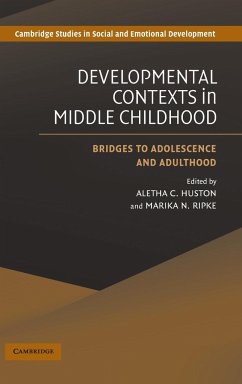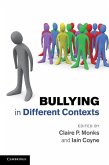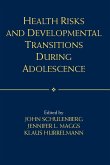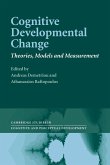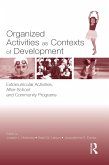Aletha Huston / Marika Ripke (eds.)
Developmental Contexts in Middle Childhood
Herausgeber: Huston, Aletha C.; Ripke, Marika N.
Aletha Huston / Marika Ripke (eds.)
Developmental Contexts in Middle Childhood
Herausgeber: Huston, Aletha C.; Ripke, Marika N.
- Gebundenes Buch
- Merkliste
- Auf die Merkliste
- Bewerten Bewerten
- Teilen
- Produkt teilen
- Produkterinnerung
- Produkterinnerung
During middle childhood, between ages 5 and 12, the foundations for later education, interpersonal relationships, and work patterns are formed. Formative experiences in early childhood and the hazards of sex, drugs, violence, and rock-n-roll in adolescence have been well-documented, but middle childhood has been neglected. This book fills the gap by presenting integrated findings from 15 longitudinal studies of the experiences in middle childhood that forecast children's development in adolescence and adulthood. Families, peers, out-of-school activities, and the broader social and economic environment all make a difference for children's futures.…mehr
Andere Kunden interessierten sich auch für
![Bullying in Different Contexts Bullying in Different Contexts]() Bullying in Different Contexts97,99 €
Bullying in Different Contexts97,99 €![Theory of Mind in Middle Childhood and Adolescence Theory of Mind in Middle Childhood and Adolescence]() Theory of Mind in Middle Childhood and Adolescence196,99 €
Theory of Mind in Middle Childhood and Adolescence196,99 €![Conflict Narratives in Middle Childhood Conflict Narratives in Middle Childhood]() Marsha D. WaltonConflict Narratives in Middle Childhood228,99 €
Marsha D. WaltonConflict Narratives in Middle Childhood228,99 €![Health and Education in Early Childhood Health and Education in Early Childhood]() Health and Education in Early Childhood46,99 €
Health and Education in Early Childhood46,99 €![Health Risks and Developmental Transitions During Adolescence Health Risks and Developmental Transitions During Adolescence]() Health Risks and Developmental Transitions During Adolescence58,99 €
Health Risks and Developmental Transitions During Adolescence58,99 €![Cognitive Developmental Change Cognitive Developmental Change]() Cognitive Developmental Change44,99 €
Cognitive Developmental Change44,99 €![Organized Activities As Contexts of Development Organized Activities As Contexts of Development]() Organized Activities As Contexts of Development197,99 €
Organized Activities As Contexts of Development197,99 €-
-
-
During middle childhood, between ages 5 and 12, the foundations for later education, interpersonal relationships, and work patterns are formed. Formative experiences in early childhood and the hazards of sex, drugs, violence, and rock-n-roll in adolescence have been well-documented, but middle childhood has been neglected. This book fills the gap by presenting integrated findings from 15 longitudinal studies of the experiences in middle childhood that forecast children's development in adolescence and adulthood. Families, peers, out-of-school activities, and the broader social and economic environment all make a difference for children's futures.
Hinweis: Dieser Artikel kann nur an eine deutsche Lieferadresse ausgeliefert werden.
Hinweis: Dieser Artikel kann nur an eine deutsche Lieferadresse ausgeliefert werden.
Produktdetails
- Produktdetails
- Verlag: Cambridge University Press
- Seitenzahl: 478
- Erscheinungstermin: 27. Juli 2006
- Englisch
- Abmessung: 235mm x 157mm x 30mm
- Gewicht: 837g
- ISBN-13: 9780521845571
- ISBN-10: 0521845572
- Artikelnr.: 21051533
- Herstellerkennzeichnung
- Libri GmbH
- Europaallee 1
- 36244 Bad Hersfeld
- gpsr@libri.de
- Verlag: Cambridge University Press
- Seitenzahl: 478
- Erscheinungstermin: 27. Juli 2006
- Englisch
- Abmessung: 235mm x 157mm x 30mm
- Gewicht: 837g
- ISBN-13: 9780521845571
- ISBN-10: 0521845572
- Artikelnr.: 21051533
- Herstellerkennzeichnung
- Libri GmbH
- Europaallee 1
- 36244 Bad Hersfeld
- gpsr@libri.de
Aletha C. Huston is Priscilla Pond Flawn Regents Professor of Child Development at the University of Texas at Austin. She is a developmental psychologist who specializes in understanding the effects of poverty on children and the impact of child care and income support policies on children's development. She is a Principal Investigator in the New Hope Project, a study of the effects on children and families of parents' participation in a work-based program to reduce poverty and collaborator in the Next Generation Project. She was a member of the MacArthur Network on Successful Pathways Through Middle Childhood and an Investigator for the National Institute of Child Health and Human Development Study of Early Child Care and Youth Development. She is President of the Society for Research in Child Development and Past President of the Division of Developmental Psychology of the American Psychological Association.
Marika N. Ripke is the Director of Hawaii Kids Count and an Affiliate Faculty member of the Center on the Family at the University of Hawaii at Manoa. Her research specializes on the effects of poverty on children and the impact of out of school activities on child and youth development. As Director of Hawaii Kids Count, she assesses (and advocates for) the well-being of Hawaii's children and families by tracking various health, economic, and educational indicators over time. She currently directs the data collection and analysis of a study examining the quality and availability of education and health supports for Native Hawaiian families and their young children. She holds a governmental position as a voting member of the State of Hawaii's Commission on Fatherhood. She has co-authored articles in such scholarly journals as Developmental Psychology, Review of Research in Education, New Directions in Youth Development, and Handbook of Child Psychology.
Marika N. Ripke is the Director of Hawaii Kids Count and an Affiliate Faculty member of the Center on the Family at the University of Hawaii at Manoa. Her research specializes on the effects of poverty on children and the impact of out of school activities on child and youth development. As Director of Hawaii Kids Count, she assesses (and advocates for) the well-being of Hawaii's children and families by tracking various health, economic, and educational indicators over time. She currently directs the data collection and analysis of a study examining the quality and availability of education and health supports for Native Hawaiian families and their young children. She holds a governmental position as a voting member of the State of Hawaii's Commission on Fatherhood. She has co-authored articles in such scholarly journals as Developmental Psychology, Review of Research in Education, New Directions in Youth Development, and Handbook of Child Psychology.
Foreword Robert C. Granger; Acknowledgments; 1. Middle childhood: contexts
of development Aletha C. Huston and Marika N. Ripke; 2. The significance of
middle childhood peer competence for work and relationships in early
adulthood W. Andrew Collins and Manfred van Dulmen; 3. Aggression and
insecurity in late adolescent romantic relationships: antecedents and
developmental pathways Gregory S. Pettit, John E. Bates, Amy
Holtzworth-Munroe, Amy D. Marshall, Lori D. Harach, David J. Cleary and
Kenneth A. Dodge; 4. Middle childhood family-contextual and personal
factors as predictors of adult outcomes L. Rowell Huesmann, Eric F. Dubow,
Leonard D. Eron and Paul Boxer; 5. Genetic and environmental influences on
continuity and change in reading achievement in the Colorado Adoption
Project Sally J. Wadsworth, Robin Corley, Robert Plomin, John K. Hewitt and
John C. DeFries; 6. Reciprocal effects of mothers' depression and
children's problem behaviors from middle childhood to early adolescence
Sara R. Jaffee and Richie Poulton; 7. Middle childhood life course
trajectories: links between family dysfunction and children's behavioral
development Linda S. Pagani, Christa Japel, Alain Girard, Abdeljelil
Farhat, Sylvana Côté and Richard E. Tremblay; 8. The contribution of middle
childhood contexts to adolescent achievement and behavior Katherine
Magnuson, Greg J. Duncan and Ariel Kalil; 9. Educational tracking within
and between schools: from first grade through middle school and beyond
Doris R. Entwisle, Karl L. Alexander and Linda Steffel Olson; 10. School
environments and the diverging pathways of students living in poverty Penny
Hauser-Cram, Marji Erickson Warfield, Jennifer Stadler and Selcuk R. Sirin;
11. The relations of classroom contexts in the early elementary years to
children's classroom and social behavior NICHD Early Child Care Research
Network; 12. Out-of-school time use during middle childhood in a low-income
sample: do combinations of activities affect achievement and behavior?
Pamela Morris and Ariel Kalil; 13. Low-income children's activity
participation as a predictor of psychosocial and academic outcomes in
middle childhood and adolescence Marika N. Ripke, Aletha C. Huston and
David M. Casey; 14. Healthy mind, healthy habits: the influence of activity
involvement in middle childhood Sandra D. Simpkins, Jennifer A. Fredricks,
Pamela E. Davis-Kean and Jacquelynne S. Eccles; 15. Media effects in middle
childhood L. Rowell Huesmann and Laramie D. Taylor; 16. Continuity and
discontinuity in middle childhood: implications for adult outcomes in the
UK 1970 birth cohort Leon Feinstein and John Bynner; 17. Mandatory
welfare-to-work programs and preschool-age children: do impacts persist
into middle childhood? Sharon M. McGroder, Martha J. Zaslow, Kristin A.
Moore and Jennifer L. Brooks; 18. Effects of welfare and employment
policies on middle-childhood school performance: do they vary by
race/ethnicity, and if so, why? Hirokazu Yoshikawa, Pamela Morris, Lisa
Gennetian, Amanda L. Roy, Anna Gassman-Pines and Erin B. Godfrey; 19.
Effects of a family poverty intervention program lasting from middle
childhood to adolescence Aletha C. Huston, Sylvia R. Epps, Mi Suk Shim,
Greg J. Duncan, Danielle A. Crosby and Marika N. Ripke; 20. Experiences in
middle childhood and children's development: a summary and integration of
research Aletha C. Huston and Marika N. Ripke.
of development Aletha C. Huston and Marika N. Ripke; 2. The significance of
middle childhood peer competence for work and relationships in early
adulthood W. Andrew Collins and Manfred van Dulmen; 3. Aggression and
insecurity in late adolescent romantic relationships: antecedents and
developmental pathways Gregory S. Pettit, John E. Bates, Amy
Holtzworth-Munroe, Amy D. Marshall, Lori D. Harach, David J. Cleary and
Kenneth A. Dodge; 4. Middle childhood family-contextual and personal
factors as predictors of adult outcomes L. Rowell Huesmann, Eric F. Dubow,
Leonard D. Eron and Paul Boxer; 5. Genetic and environmental influences on
continuity and change in reading achievement in the Colorado Adoption
Project Sally J. Wadsworth, Robin Corley, Robert Plomin, John K. Hewitt and
John C. DeFries; 6. Reciprocal effects of mothers' depression and
children's problem behaviors from middle childhood to early adolescence
Sara R. Jaffee and Richie Poulton; 7. Middle childhood life course
trajectories: links between family dysfunction and children's behavioral
development Linda S. Pagani, Christa Japel, Alain Girard, Abdeljelil
Farhat, Sylvana Côté and Richard E. Tremblay; 8. The contribution of middle
childhood contexts to adolescent achievement and behavior Katherine
Magnuson, Greg J. Duncan and Ariel Kalil; 9. Educational tracking within
and between schools: from first grade through middle school and beyond
Doris R. Entwisle, Karl L. Alexander and Linda Steffel Olson; 10. School
environments and the diverging pathways of students living in poverty Penny
Hauser-Cram, Marji Erickson Warfield, Jennifer Stadler and Selcuk R. Sirin;
11. The relations of classroom contexts in the early elementary years to
children's classroom and social behavior NICHD Early Child Care Research
Network; 12. Out-of-school time use during middle childhood in a low-income
sample: do combinations of activities affect achievement and behavior?
Pamela Morris and Ariel Kalil; 13. Low-income children's activity
participation as a predictor of psychosocial and academic outcomes in
middle childhood and adolescence Marika N. Ripke, Aletha C. Huston and
David M. Casey; 14. Healthy mind, healthy habits: the influence of activity
involvement in middle childhood Sandra D. Simpkins, Jennifer A. Fredricks,
Pamela E. Davis-Kean and Jacquelynne S. Eccles; 15. Media effects in middle
childhood L. Rowell Huesmann and Laramie D. Taylor; 16. Continuity and
discontinuity in middle childhood: implications for adult outcomes in the
UK 1970 birth cohort Leon Feinstein and John Bynner; 17. Mandatory
welfare-to-work programs and preschool-age children: do impacts persist
into middle childhood? Sharon M. McGroder, Martha J. Zaslow, Kristin A.
Moore and Jennifer L. Brooks; 18. Effects of welfare and employment
policies on middle-childhood school performance: do they vary by
race/ethnicity, and if so, why? Hirokazu Yoshikawa, Pamela Morris, Lisa
Gennetian, Amanda L. Roy, Anna Gassman-Pines and Erin B. Godfrey; 19.
Effects of a family poverty intervention program lasting from middle
childhood to adolescence Aletha C. Huston, Sylvia R. Epps, Mi Suk Shim,
Greg J. Duncan, Danielle A. Crosby and Marika N. Ripke; 20. Experiences in
middle childhood and children's development: a summary and integration of
research Aletha C. Huston and Marika N. Ripke.
Foreword Robert C. Granger; Acknowledgments; 1. Middle childhood: contexts
of development Aletha C. Huston and Marika N. Ripke; 2. The significance of
middle childhood peer competence for work and relationships in early
adulthood W. Andrew Collins and Manfred van Dulmen; 3. Aggression and
insecurity in late adolescent romantic relationships: antecedents and
developmental pathways Gregory S. Pettit, John E. Bates, Amy
Holtzworth-Munroe, Amy D. Marshall, Lori D. Harach, David J. Cleary and
Kenneth A. Dodge; 4. Middle childhood family-contextual and personal
factors as predictors of adult outcomes L. Rowell Huesmann, Eric F. Dubow,
Leonard D. Eron and Paul Boxer; 5. Genetic and environmental influences on
continuity and change in reading achievement in the Colorado Adoption
Project Sally J. Wadsworth, Robin Corley, Robert Plomin, John K. Hewitt and
John C. DeFries; 6. Reciprocal effects of mothers' depression and
children's problem behaviors from middle childhood to early adolescence
Sara R. Jaffee and Richie Poulton; 7. Middle childhood life course
trajectories: links between family dysfunction and children's behavioral
development Linda S. Pagani, Christa Japel, Alain Girard, Abdeljelil
Farhat, Sylvana Côté and Richard E. Tremblay; 8. The contribution of middle
childhood contexts to adolescent achievement and behavior Katherine
Magnuson, Greg J. Duncan and Ariel Kalil; 9. Educational tracking within
and between schools: from first grade through middle school and beyond
Doris R. Entwisle, Karl L. Alexander and Linda Steffel Olson; 10. School
environments and the diverging pathways of students living in poverty Penny
Hauser-Cram, Marji Erickson Warfield, Jennifer Stadler and Selcuk R. Sirin;
11. The relations of classroom contexts in the early elementary years to
children's classroom and social behavior NICHD Early Child Care Research
Network; 12. Out-of-school time use during middle childhood in a low-income
sample: do combinations of activities affect achievement and behavior?
Pamela Morris and Ariel Kalil; 13. Low-income children's activity
participation as a predictor of psychosocial and academic outcomes in
middle childhood and adolescence Marika N. Ripke, Aletha C. Huston and
David M. Casey; 14. Healthy mind, healthy habits: the influence of activity
involvement in middle childhood Sandra D. Simpkins, Jennifer A. Fredricks,
Pamela E. Davis-Kean and Jacquelynne S. Eccles; 15. Media effects in middle
childhood L. Rowell Huesmann and Laramie D. Taylor; 16. Continuity and
discontinuity in middle childhood: implications for adult outcomes in the
UK 1970 birth cohort Leon Feinstein and John Bynner; 17. Mandatory
welfare-to-work programs and preschool-age children: do impacts persist
into middle childhood? Sharon M. McGroder, Martha J. Zaslow, Kristin A.
Moore and Jennifer L. Brooks; 18. Effects of welfare and employment
policies on middle-childhood school performance: do they vary by
race/ethnicity, and if so, why? Hirokazu Yoshikawa, Pamela Morris, Lisa
Gennetian, Amanda L. Roy, Anna Gassman-Pines and Erin B. Godfrey; 19.
Effects of a family poverty intervention program lasting from middle
childhood to adolescence Aletha C. Huston, Sylvia R. Epps, Mi Suk Shim,
Greg J. Duncan, Danielle A. Crosby and Marika N. Ripke; 20. Experiences in
middle childhood and children's development: a summary and integration of
research Aletha C. Huston and Marika N. Ripke.
of development Aletha C. Huston and Marika N. Ripke; 2. The significance of
middle childhood peer competence for work and relationships in early
adulthood W. Andrew Collins and Manfred van Dulmen; 3. Aggression and
insecurity in late adolescent romantic relationships: antecedents and
developmental pathways Gregory S. Pettit, John E. Bates, Amy
Holtzworth-Munroe, Amy D. Marshall, Lori D. Harach, David J. Cleary and
Kenneth A. Dodge; 4. Middle childhood family-contextual and personal
factors as predictors of adult outcomes L. Rowell Huesmann, Eric F. Dubow,
Leonard D. Eron and Paul Boxer; 5. Genetic and environmental influences on
continuity and change in reading achievement in the Colorado Adoption
Project Sally J. Wadsworth, Robin Corley, Robert Plomin, John K. Hewitt and
John C. DeFries; 6. Reciprocal effects of mothers' depression and
children's problem behaviors from middle childhood to early adolescence
Sara R. Jaffee and Richie Poulton; 7. Middle childhood life course
trajectories: links between family dysfunction and children's behavioral
development Linda S. Pagani, Christa Japel, Alain Girard, Abdeljelil
Farhat, Sylvana Côté and Richard E. Tremblay; 8. The contribution of middle
childhood contexts to adolescent achievement and behavior Katherine
Magnuson, Greg J. Duncan and Ariel Kalil; 9. Educational tracking within
and between schools: from first grade through middle school and beyond
Doris R. Entwisle, Karl L. Alexander and Linda Steffel Olson; 10. School
environments and the diverging pathways of students living in poverty Penny
Hauser-Cram, Marji Erickson Warfield, Jennifer Stadler and Selcuk R. Sirin;
11. The relations of classroom contexts in the early elementary years to
children's classroom and social behavior NICHD Early Child Care Research
Network; 12. Out-of-school time use during middle childhood in a low-income
sample: do combinations of activities affect achievement and behavior?
Pamela Morris and Ariel Kalil; 13. Low-income children's activity
participation as a predictor of psychosocial and academic outcomes in
middle childhood and adolescence Marika N. Ripke, Aletha C. Huston and
David M. Casey; 14. Healthy mind, healthy habits: the influence of activity
involvement in middle childhood Sandra D. Simpkins, Jennifer A. Fredricks,
Pamela E. Davis-Kean and Jacquelynne S. Eccles; 15. Media effects in middle
childhood L. Rowell Huesmann and Laramie D. Taylor; 16. Continuity and
discontinuity in middle childhood: implications for adult outcomes in the
UK 1970 birth cohort Leon Feinstein and John Bynner; 17. Mandatory
welfare-to-work programs and preschool-age children: do impacts persist
into middle childhood? Sharon M. McGroder, Martha J. Zaslow, Kristin A.
Moore and Jennifer L. Brooks; 18. Effects of welfare and employment
policies on middle-childhood school performance: do they vary by
race/ethnicity, and if so, why? Hirokazu Yoshikawa, Pamela Morris, Lisa
Gennetian, Amanda L. Roy, Anna Gassman-Pines and Erin B. Godfrey; 19.
Effects of a family poverty intervention program lasting from middle
childhood to adolescence Aletha C. Huston, Sylvia R. Epps, Mi Suk Shim,
Greg J. Duncan, Danielle A. Crosby and Marika N. Ripke; 20. Experiences in
middle childhood and children's development: a summary and integration of
research Aletha C. Huston and Marika N. Ripke.

